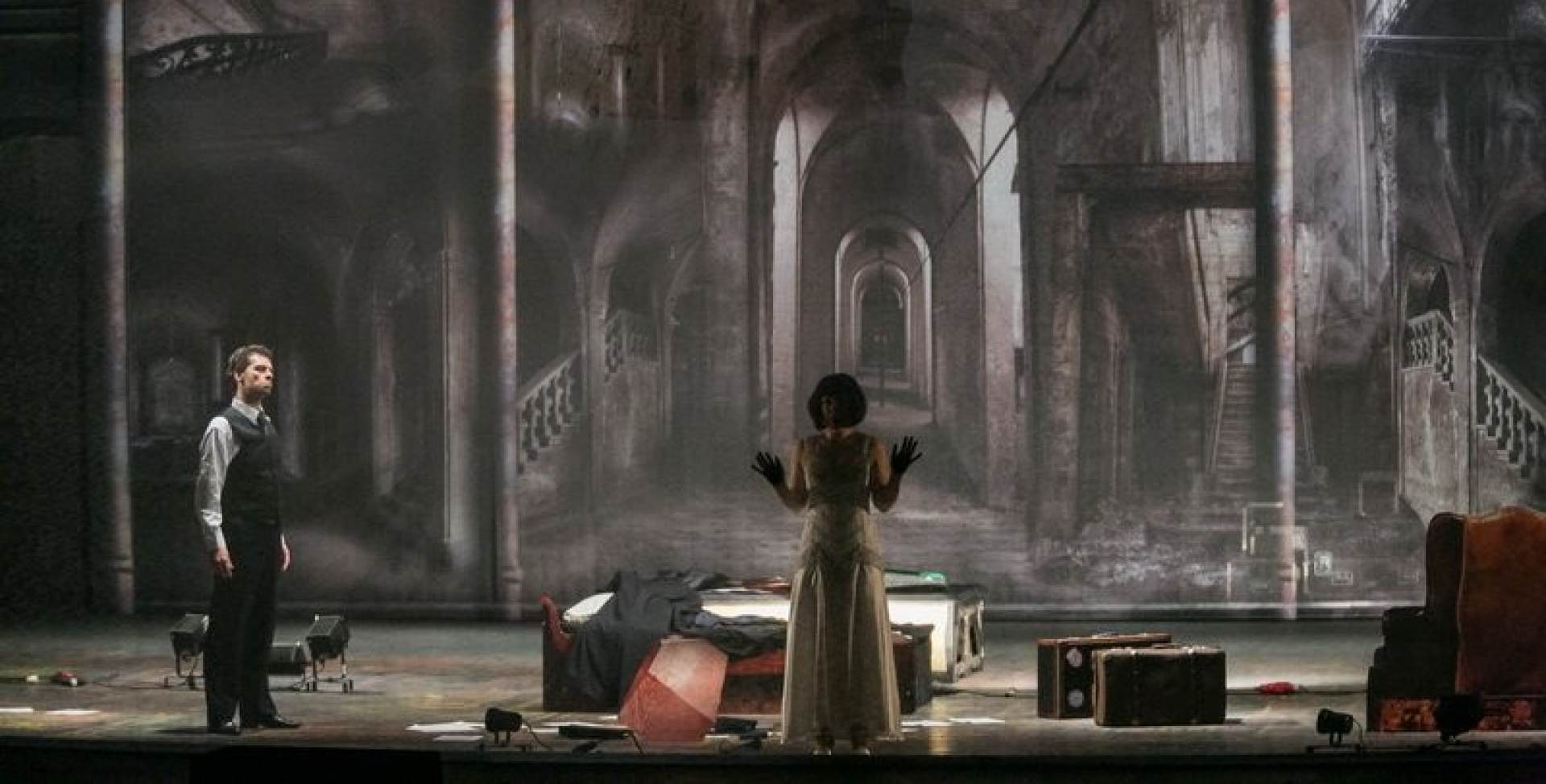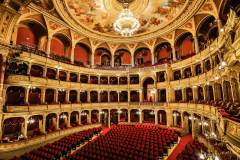Mario and The Magician / Bluebeards Castle
Mo | Tu | We | Th | Fr | Sa | Su |
MARIO AND THE MAGICIAN - János Vajda
BLUEBEARD'S CASTLE - Béla Bartók
One act operas, in Hungarian, with Hungarian and English surtitles
Performance length: 2 hours 30 minutes, with 1 intermission.
How far do we let other people into our minds, our soul, and our past? And what happens if someone pushes their way into our consciousness even though we haven't let them in? Béla Bartók and Béla Balázs's world-famous opera offers insight into the various layers and stages of the relationship between men and women, while János Vajda's work based on the famous novella by Thomas Mann depicts the effects of blind extremism and mass hypnosis. Two brilliant 20th century one-act operas in one evening: both Hungarian, and both about the deepest functioning of the human mind and how the psyche can be influenced.
Mario and the Magician - János Vajda
"You do what you like. Or is it possible you have ever not done what you liked – or even, maybe, what you didn't like?" The atmosphere is an unpleasant one in this memory of Torre de Venere. The audience members at an Italian resort town fall, against their will, under the influence of a remarkable magician – with the exception of one person.
"Tolerance becomes a crime when applied to evil," said Thomas Mann, whose highly influential novel Mario and the Magician János Vajda use as the basis for his opera of the same name, one of the most successful and affecting works in modern Hungarian opera history. The work will be shown at the Opera House in a production directed by Péter Galambos, with Krisztián Cser in the principal role.
Bluebeard's Castle - Béla Bartók
Bartók's sole opera provides a glimpse, by way of seven symbolic doors, into the secrets of the human soul. The enigmatic work follows the evolution of the relationship between two people and the different stages of getting to know each other and growing apart refracted allegorically through symbols with many meanings. All the while, it suggests that it is not the drama of a man and a woman unfolding before the viewer's eyes, but rather a man's drama and a woman's drama. As director Péter Galambos put it at the time of the 2013 premiere: “The deeper they probe into understanding their own demons, the more uncertain they become. Their curiosity, however, is still greater than their fear. Confronting our demons – no matter how painful it may be – leads to an understanding of ourselves.”
Program and cast
Mario and the Magician
Conductor: János Kovács
Cipolla: András Palerdi, Gábor Bretz
Mario: Balázs Csémy
Madam Angiolieri: Laura Topolánszky
Mr. Angiolieri: András Hábetler
The woollen-shirted one: Márió Matyó
Gentleman from Rome: Lajos Geiger
Bluebeard's Castle
Conductor: János Kovács
Judith: Erika Gál, Viktória Mester
Bluebeard: András Palerdi, Gábor Bretz
Hungarian State Opera
STANDING ROOM TICKETS - INFORMATION IN CASE OF A FULL HOUSE!
If all the seats are sold out for the selected time, but you still want to see the production on that day, 84 of the extremely affordable standing seats will be sold at the theatre, 2 hours before the start of the performance, with which you can visit the gallery on the 3rd floor. Tickets can be purchased at the ticket office of the Budapest Opera House. We would like to draw your attention to the fact that the stage can only be seen to a limited extent from the standing places and the side seats, but at the same time, following the performance is also supported by television broadcasting on the spot.
The Opera House is not only one of the most significant art relic of Budapest, but the symbol of the Hungarian operatic tradition of more than three hundred years as well. The long-awaited moment in Hungarian opera life arrived on September 27, 1884, when, in the presence of Franz Joseph I. the Opera House was opened amid great pomp and ceremony. The event, however, erupted into a small scandal - the curious crowd broke into the entrance hall and overran the security guards in order to catch a glimpse of the splendid Palace on Sugar út. Designed by Mikós Ybl, a major figure of 19th century Hungarian architecture, the construction lived up to the highest expectations. Ornamentation included paintings and sculptures by leading figures of Hungarian art of the time: Károly Lotz, Bertalan Székely, Mór Than and Alajos Stróbl. The great bronze chandelier from Mainz and the stage machinery moda by the Asphaleia company of Vienna were both considered as cutting-edge technology at that time.
Many important artists were guests here including Gustav Mahler, the composer who was director in Budapest from 1887 to 1891. He founded the international prestige of the institution, performing Wagner operas as well as Magcagni’ Cavalleria Rusticana. The Hungarian State Opera has always maintained high professional standards, inviting international stars like Renée Fleming, Cecilia Bartoli, Monserrat Caballé, Placido Domingo, Luciano Pavarotti, José Cura, Thomas Hampson and Juan Diego Flórez to perform on its stage. The Hungarian cast include outstanding and renowed artists like Éva Marton, Ilona Tokody, Andrea Rost, Dénes Gulyás, Attila Fekete and Gábor Bretz.

 EN
EN DE
DE IT
IT FR
FR ES
ES RU
RU JP
JP RO
RO
 Seating plan
Seating plan 